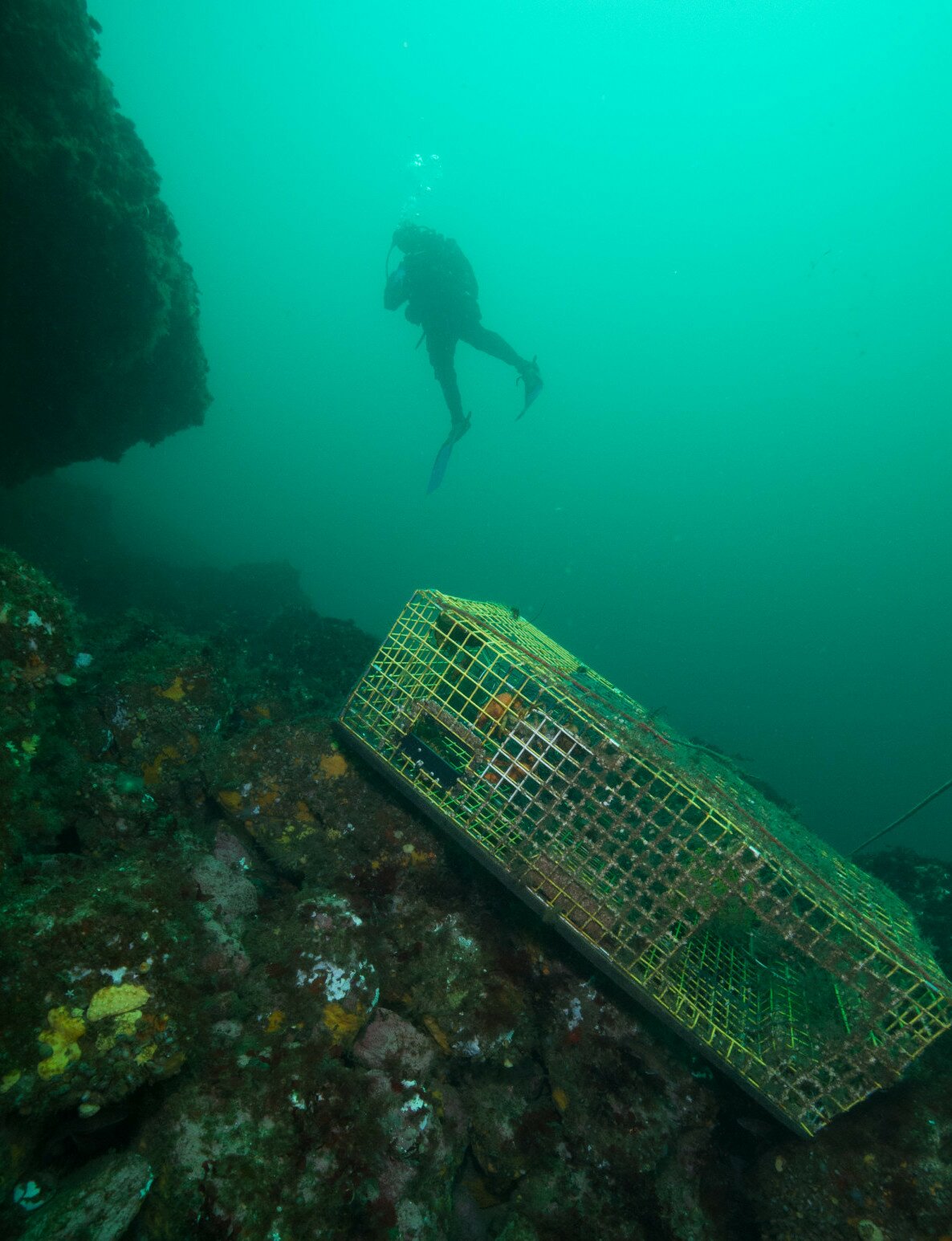First “Ecosystems-Based Management” Working Group Meeting Takes Birds-eye Approach

Since its creation in 2012, the Northeast Regional Planning Body (RPB) has led the nation in regional ocean planning, with New England’s draft ocean plan due out March 2016.
What is ecosystems-based management?

A diver comes across a lobster trap at Isles of Shoals. Effective management of the ocean, including IEAs and multi-use areas, starts with ecosystems-based management
The proposed northeast ocean plan strives to align with ecosystems-based management, an approach that perceives the ocean as a system in constant interplay between marine species, ecosystems, and human activity, rather than analyzing each component individually. Last month, in a public meeting in Portsmouth, the RPB held its first Ecosystems-Based Management Work Group (EBMWG) meeting, bringing the body one step closer to achieving the best possible regional ocean plan.
Consisting of both RPB members and professionals with science or technical backgrounds, the EBMWG is tasked with four main objectives:
- Informing and providing meaningful input to the RPB’s digital map archive.
- Considering potential methodologies through which the planning body will define Important Ecological Areas (IEA), as well as delineating areas suitable for a spectrum of human uses. (Conservation Law Foundation strongly advocates for the determination of IEAs, and is pleased that the EBMWG is investigating this possibility.)
- Lastly, the Northeast Regional Ocean Plan is designed to be a transformative document and one that should be improved upon throughout its implementation. The EBMWG will provide guidance and recommendations for analyzing the progress of the finished plan, ensuring the plan’s long-term success.
Such a tall order is absolutely a reflection of the high standards and commitment of the RPB, in its effort to not only usher in the first regional ocean plan in the nation, but one that is representative of the diversity of voices and the ecosystems we must strive to protect.
At its first meeting, EBMWG reviewed data and maps that detail marine life, sea floor characteristics, and elements unique to the “open-ocean zone,” otherwise known as pelagic areas. The overview provided a baseline understanding for all members, and easily flowed to a discussion on ways to either “stack” or “layer” human, marine life and ecological data to determine criteria for important ecological areas.
Shaping the scope of work for the long haul
Given that the first meeting was just one of many, members considered ecosystems based management with a “bird’s eye” perspective, and future meetings will further clarify and build actual recommendations for determining important ecological areas and monitoring the overall success of the implemented regional ocean plan.
Important questions were asked during the meeting, all of which will shape the scope of the group’s work, including:
- What factors (such as habitats and species) should be considered to determine important ecological areas?
- How will we ensure that data flows easily between the Northeast and the neighboring Mid-Atlantic region throughout their mutual ocean planning processes?
- Will layering data miss out on vital information that could inform Important Ecological Area designation? And if so, how can we avoid that?
- What can be defined as an ecological impact?
An ecosystems-based management approach ensures that both vital habitats and human processes can coexist in a way that minimizes conflict, improves ecosystem health, and supports thriving coastal economies. It is thrilling to witness the Northeast RPB not only prioritize such an approach, but to also assemble a work group committed to ensuring that ecosystems based management is successfully incorporated into the finished regional ocean plan.
While there is much to be accomplished between now and the release of the draft regional ocean plan in March of next year, the inaugural meeting of the EBMWG is a strong sign that the final ocean plan will establish a strong standard for other regions to reference as they begin their ocean planning process.





Recent Comments